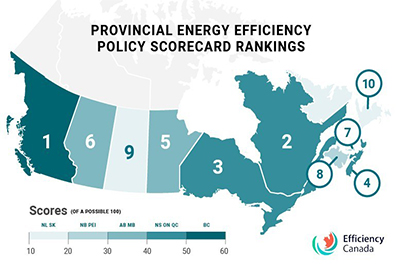First-ever Provincial Energy Efficiency Scorecard Ranks Provinces on Policy, Programs

Nov 20, 2019
Want to know how your province is doing to help you save energy? The national voice for an energy efficient economy, Carleton University-based advocacy organization Efficiency Canada, launched the country’s first-ever Provincial Energy Efficiency Scorecard today, accompanied by a regularly-updated policy database.
“Imagine thinking of all that energy waste from our homes, businesses and industry as a ‘resource’, just like natural gas, oil or wind turbines,” said Corey Diamond executive director of Efficiency Canada. “Now imagine harvesting that ‘resource’ in every community across Canada, creating jobs and meeting our climate change commitments. At a time when much of the country is at odds on our energy future, boosting energy efficiency is surely something all Canadians can agree on.”
“Today’s launch of the Provincial Energy Efficiency Scorecard tracks progress across the country, creating a friendly competition amongst the provinces so we can reach the potential that energy efficiency has to offer,” added Diamond.
The Canadian scorecard — similar to the state scorecard released annually by the American Council for an Energy Efficient Economy (ACEEE) — measures policy progress on energy efficiency programs, enabling policies, buildings, transportation, and industry.
“British Columbia received the top score because of policies like the Energy Step Code that create a clear pathway towards net-zero energy-ready buildings, natural gas efficiency targets, and support for vehicle electrification. Quebec scores second, and is the national transportation leader,” explains Dr. Brendan Haley, the study’s lead author and the policy director at Efficiency Canada.
“In every province, we found both strengths and areas for improvement. We also identified policy gaps across all provinces that should be priorities for federal action — including catalyzing finance, building code implementation and compliance, transforming heating markets, and training for efficiency jobs,” added Haley.
Energy efficiency — the energy saved with efficient and “smart” buildings, technologies and appliances — is increasingly being recognized as a vital tool for climate change mitigation. The International Energy Agency (IEA) estimates that 40 per cent of global Paris Agreement GHG reduction commitments can be met with energy efficiency measures, such as better insulation, smart home heating and cooling technologies, LED lighting, and high-efficiency appliances.
An earlier report by Efficiency Canada estimated that 118,000 annual jobs would be created between now and 2030 by implementing the energy saving policies found in the Pan-Canadian Framework on Clean Growth and Climate Change.
The 2019 scorecard is a first for the organization. Launched in November 2018 at Carleton University’s Sustainable Energy Research Centre, Efficiency Canada aims to make Canada a global leader in energy efficiency policy, technology, and jobs.

















